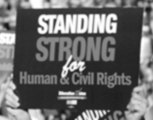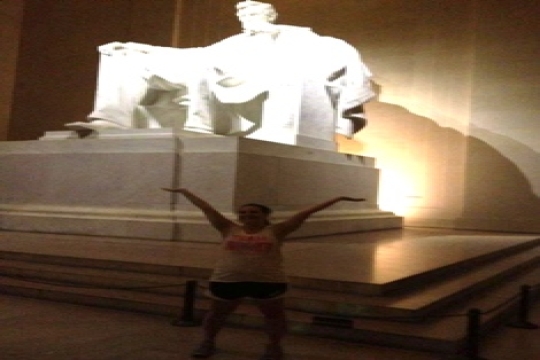
Photo courtesy of the NEA.
On Thursday, June 28, as part of my internship with the National Education Association, I had the opportunity to attend the Joint Conference on Concerns of Women and Minorities. Every year, the Joint Conference provides a forum for teachers who are active on social justice issues. At the opening session, NEA Executive Director John Stocks said the conference is “where social justice fighters strap on their armor and prepare to fight their next battle.” Not knowing what to expect at the conference, I figured that this was just rhetorical exaggeration. And, to be honest, I was slightly frustrated that attending the conference meant I could not be waiting outside the Supreme Court to hear the decision on the Affordable Care Act. But by the end of the day I was amazed, inspired, and so proud to be a part of the NEA this summer.
Over the course of the two sessions I attended, I realized that these teachers and educational support professionals are warriors. They are fighting every single day for the well-being of their students, the success of their school districts and their rights as professionals. Their work extends far beyond the classroom, fighting such issues as racism, poverty, voter disenfranchisement, environmental issues, discrimination and so many more. And they do this because they believe it is part of what it means to be a teacher. Their ideological devotion to their students drives them to be fierce critics of injustice. One teacher spoke of her job at an underperforming school on a Native American reservation. By implementing new methods of cooperation between teachers and helping to devise a curriculum focused on the students’ ethnic heritage, she turned the school into one of the most successful in the district. An art teacher from Ohio explained how he began to canvass in support of the union’s collective bargaining rights. His students were surprised to find him at their houses talking about such a political issue, but his sense of civic duty inspired them to get involved, too. The highlight of my day at the conference was when, in the middle of a speaker’s presentation, an NEA staff member walked up to the stage with a note. The Supreme Court had just released its decision on health care, and we were all anxiously anticipating the result. When they announced that the Act was upheld, the entire room exploded. The 500 teachers all screamed, jumping up and down in excitement. Before this experience, I had thought of teaching and politics to be two very different realms. But as one speaker put it, children learn their morals at school. Teachers are responsible for creating an environment in which students can flourish. Teachers know that the Affordable Care Act is morally right and important for their children, and for that reason the NEA was a strong force in promoting Obama’s vision of universal health care. This experience affirmed something that a professor told me at the end of this past semester: Don’t worry too much about finding a career that will change the world. Instead, find a career that you enjoy, and whatever it is, use it to change the world. These teachers may not live in Washington D.C. or be regulars on Capitol Hill. But on Thursday I saw how passion and activism can create real change. Their involvement in local and national politics is inspiring. They fight for social justice every day both in and out of the classroom, and they are inspiring their students to join them.
Rachel Klepper is a participant in the Machon Kaplan Summer Social Action Internship Program. She is interning at the National Education Association.
Related Posts

From the White House to the RAC: Two Summers in Washington DC

